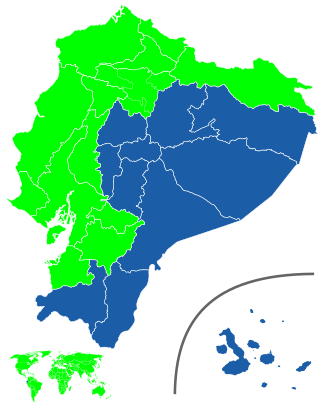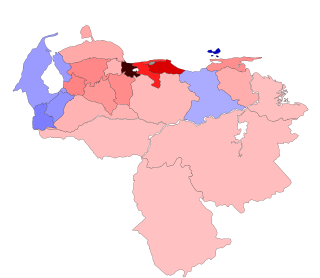
The National Electoral Council is the head of one of the five branches of government of Venezuela under its 1999 constitution. It is the institution that has the responsibility of overseeing and guaranteeing the transparency of all elections and referendums in Venezuela at the local, regional, and national levels. The creation of the CNE was ratified in Venezuela's 1999 constitutional referendum. Following the election of Nicolás Maduro into the presidency, the CNE has been described, by the president's opponents, as being pro-Maduro.

The Venezuelan recall referendum of 15 August 2004 was a referendum to determine whether Hugo Chávez, then President of Venezuela, should be recalled from office. The recall referendum was announced on 8 June 2004 by the National Electoral Council (CNE) after the Venezuelan opposition succeeded in collecting the number of signatures required by the 1999 Constitution to effect a recall. The result of the referendum was not to recall Chávez.

General elections were held in Venezuela on 30 July 2000, the first under the country's newly adopted 1999 constitution. Incumbent President Hugo Chávez ran for election for a full six-year term under the new constitution. He was challenged by another leftist and former ally, Zulia Governor Francisco Arias Cárdenas. Chávez won the election with almost 60% of the popular vote, increasing his vote share over the previous elections and managing to carry a larger number of states. Arias Cárdenas only managed to narrowly carry his home state of Zulia.

Elections in Venezuela are held at a national level for the President of Venezuela as head of state and head of government, and for a unicameral legislature. The President of Venezuela is elected for a six-year term by direct election plurality voting, and is eligible for re-election. The National Assembly (Asamblea Nacional) has 277 members (diputados), elected for five-year terms using a mixed-member majoritarian representation system. Elections also take place at state level and local level.

Presidential elections were held in Venezuela on 3 December 2006 to elect a president for a six-year term to begin on 10 January 2007. The contest was primarily between incumbent President Hugo Chávez, and Zulia Governor Manuel Rosales of the opposition party A New Era.

Parliamentary elections were held in Venezuela on 4 December 2005 to elect the 167 deputies to the National Assembly of Venezuela, twelve deputies to the Latin American Parliament and five deputies to the Andean Parliament. Several days prior to the elections, five opposition parties unexpectedly withdrew, shortly after a dispute over the voting process had apparently been resolved with the support of the Organization of American States (OAS). The opposition had been expected to get around a third of the Assembly seats, or even less; the withdrawal meant the opposition were scarcely represented in the parliament at all, as the opposition parties which did not withdraw failed to win any seats. 114 seats went to the President's Fifth Republic Movement (MVR) – up from 86, with the remaining 53 going to "smaller pro-Chávez parties as well as to independents and representatives of some social groups that support the government".

Henrique Capriles Radonski is a Venezuelan politician and lawyer, who served as the 36th Governor of Miranda from 2008 to 2017.

The 2010 parliamentary election in Venezuela took place on 26 September 2010 to elect the 165 deputies to the National Assembly. Venezuelan opposition parties, which had boycotted the previous election thus allowing the governing Fifth Republic Movement (MVR) to gain a two-thirds super majority, participated in the election through the Coalition for Democratic Unity (MUD). In 2007 the Fifth Republic Movement dissolved and the United Socialist Party of Venezuela was formed as the leading government party. Nationally, the popular vote was split equally between PSUV and MUD, but PSUV won a majority of the first-past-the-post seats and consequently retained a substantial majority in the Assembly, although falling short of both two-thirds and three-fifths super majority marks.
Didalco Bolívar is a Venezuelan politician, and was Governor of Aragua State from 1995 to 2008. His first three election victories were as a representative of the Movement for Socialism. In the 2004 elections he represented For Social Democracy (PODEMOS), a party he co-founded in 2003.

Presidential elections were held in Venezuela on 14 April 2013 following the death of President Hugo Chávez on 5 March 2013. Nicolás Maduro—who had assumed the role of acting president since Chávez's death—was declared winner with a narrow victory over his opponent Henrique Capriles, the Governor of Miranda. Capriles had run in the previous election less than a year before, losing to Chávez by an 11-point margin. This time the margin of victory was much smaller, and thus became the closest presidential election of the country since the 1968 election.

General elections were held in Ecuador on 19 February 2017 alongside a referendum on tax havens. Voters elected a new President and National Assembly. Incumbent President Rafael Correa of the PAIS Alliance was not eligible for re-election, having served three terms. In the first round of the presidential elections, PAIS Alliance candidate Lenín Moreno received 39% of the vote. Although he was more than 10% ahead of his nearest rival, Guillermo Lasso of the Creating Opportunities party, Moreno was just short of the 40% threshold required to avoid a run-off. As a result, a second round was held on 2 April. In the second round Moreno was elected president with 51.16% of the vote.

On 14 April 2013, Nicolás Maduro was elected President of Venezuela, narrowly defeating opposition candidate Henrique Capriles with just 1.5% of the vote separating the two candidates. Capriles immediately demanded a recount, refusing to recognize the outcome as valid. Maduro was later formally inaugurated as President on 19 April, after the election commission had promised a full audit of the election results. On 24 October 2013, he announced the creation of a new agency, the Vice Ministry of Supreme Happiness, to coordinate all the social programmes.

Presidential elections were held in Venezuela on 20 May 2018, with incumbent Nicolás Maduro being declared re-elected for a second six-year term. The original electoral date was scheduled for December 2018 but was subsequently pulled ahead to 22 April before being pushed back to 20 May. Some analysts described the poll as a sham election, as many prominent opposition parties had been barred from participating in it. The elections had the lowest voter turnout in Venezuela's democratic era.

Regional elections were held in Venezuela on 15 October 2017 to elect the executive position of all 23 federal entities. This marked the first state executive election not held on the same date as elections for state legislatures, and the second separate from municipal elections. They were the 9th regional elections held in Venezuela since 1989.

Municipal elections were held in Venezuela on 10 December 2017, to elect 335 mayors throughout Venezuela, as well as the governor of the state of Zulia. This was the first municipal election held since 2013, when elections were delayed from 2012 following the death of Hugo Chávez. The election resulted in many members of the United Socialist Party of Venezuela being elected as heads of municipal governments throughout Venezuela.

Constituent Assembly elections were held in Venezuela on 30 July 2017 to elect the members of the 2017 Constituent National Assembly. Unlike the 1999 Constituent National Assembly, which was assembled following a referendum, the 2017 election was convened by the presidential decree of President Nicolás Maduro. Smartmatic, the company which provided the voting machines, stated that the results were tampered with by the CNE, and that the turnout was off by at least one million votes.
Parliamentary elections were held in Venezuela on 6 December 2020. Aside from the 167 deputies of the National Assembly who are eligible to be re-elected, the new National Electoral Council president announced that the assembly would increase by 110 seats, for a total of 277 deputies to be elected.

Presidential elections were held in Venezuela on 28 July 2024 to choose a president for a six-year term beginning on 10 January 2025. The election was politically contentious, with international monitors calling it neither free nor fair, citing the incumbent Maduro administration having controlled most institutions and repressed the political opposition before, during, and after the election. Widely viewed as having won the election, former diplomat Edmundo González Urrutia fled to asylum in Spain amid repression of dissent and a national and international political crisis that resulted when Venezuelan electoral authorities announced—without presenting any evidence—that Nicolás Maduro won.

Regional and municipal elections were held in Venezuela on 21 November 2021. In the elections, all executive and legislative positions of the 23 federal entities, as well as that of the 335 municipalities of the country, were renewed.

Venezuela First is a Venezuelan political party led by former members of the opposition coalition Democratic Unity Roundtable.
















